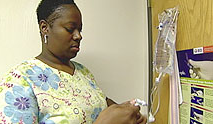The Takeaway
- Sleep is essential to good health, along with diet and exercise.
- Many people simply accept their sleep problems, but there are many things you can do to ensure adequate rest.
- Sleep specialists help people recognize and change behaviors that interfere with sleep and can diagnose sleep disorders.
Dedicating Yourself to Good Sleep

If you spend your nights half-awake and your days half-asleep, maybe it's time to address your sleep issues. While most Americans with sleep problems just live with their chronic tiredness, there's no need to do so when there are many effective solutions.
To get restful sleep, you need to make it a priority. "People have to understand that sleep is one of the basics of good health, along with diet and exercise. So it's important that they set aside enough time to get an adequate amount of sleep," says Dr. Lawrence J. Epstein, Medical Director of Sleep Health Centers and an instructor at Harvard Medical School. "I also tell them to adopt an overall healthy lifestyle. People who are fit, who exercise regularly, and who are in good shape sleep better."
Small Changes Can Make a Big Difference

Lack of sleep can be a wake-up call to change habits and behaviors that interfere with sound, restorative sleep. How you spend your days can affect your nights. Stress and a fast-paced lifestyle can make you too stimulated to sleep. And while consuming caffeine or alcohol or engaging in stressful activities close to bedtime can disrupt sleep, curbing some of these nighttime sleep disrupters may be enough to solve your sleep problem. You'll also sleep better if you have a quiet sleep environment and a consistent sleep schedule. Read more about this in Twelve Simple Tips to Improve Your Sleep.
"People who are able to look at their sleep systematically, determine the factors contributing to their problem, and tackle these things in a program that makes sense to them can be very, very successful at overcoming the problem," says Stephen Amira, a clinical psychologist with a specialty in sleep disorders.
Barbra, a night shift nurse at a community hospital in Boston, found it difficult to get enough sleep. She consulted Dr. Epstein to help her sleep better and feel more alert at work. After adopting some of his suggestions—going to sleep earlier, exercising regularly, eating healthy foods, and turning off the phone during her sleep time—Barbra reports that she sleeps longer and feels more energetic. "Protecting my sleep is better for me physically, mentally, and spiritually," she says. To find out more, see Barbra's Sleep Makeover.
Dr. Lawrence J. Epstein discusses why shift workers are at risk for having problems with their sleep.
What to Do if the Problem Persists

If you've tried everything and still can't manage to get adequate sleep, you may wish to consult your primary care physician. He or she can help determine whether your sleep problem is a symptom of some other condition, such as depression, anxiety, diabetes, or arthritis. Your primary care physician may refer you to a sleep specialist. You can also find a list of specialists at the American Academy of Sleep Medicine, www.sleepeducation.org, and at the National Sleep Foundation, www.thensf.org. A sleep specialist can assess your sleep problem, determine if you have a sleep disorder, and develop a treatment plan that addresses your life situation and sleep issues. To find out more, see An Overview of Sleep Disorders and Sleep Disorders Screening Survey in the Healthy Sleep module.
If you find that making changes to improve your sleep are not working, that’s the time to seek out help because you may have a sleep disorder that requires medical evaluation and treatment.
-Dr. Lawrence J. Epstein
What to Expect from a Sleep Evaluation
A sleep specialist will review the sleep history questionnaire or sleep diary that you have completed prior to your appointment, ask follow-up questions, and perform a brief physical examination. Then the specialist will likely make a preliminary diagnosis of your problem. Learn more about this in Behavioral Sleep Consultation in the Healthy Sleep module. Depending on the diagnosis, you may need to take a home sleep test or undergo an overnight sleep study (polysomnogram) at a sleep center to record your brain and physical activity during sleep. Sleep tests are particularly useful in detecting sleep disorders such as sleep apnea and narcolepsy.
Once your diagnosis is confirmed, the specialist will discuss treatment options with you and develop a treatment plan that meets your needs. Whether your problem is due to poor sleep habits or a sleep disorder, there are many treatments that can make healthy sleep a nightly reality.
Dr. Christopher P. Landrigan discusses when medication might be advised to overcome difficulties sleeping.